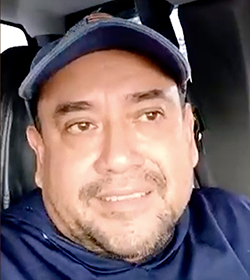- Slug: BC-CNS-Immigrant Interpreters,530 words.
- 2 photos, video story available (thumbnails, captions below)
By Adriana Gonzalez-Chavez
Cronkite News
PHOENIX – Asylum seekers who don’t speak English are once again required to bring their own interpreters to interviews for U.S. immigration services, and some worry it will be a hindrance for those fleeing persecution in their home countries.
The September rule change reverted to a pre-pandemic requirement that put the onus on non-English-speaking migrants to find and pay for an interpreter.
Instructions from U.S. Citizenship and Immigration Services advise asylum applicants that “if you need an interpreter and do not bring one, or if your interpreter is not fluent in English and a language you speak, and you do not establish good cause, we may consider this a failure to appear for your interview and we may dismiss your asylum application or refer your asylum application to an immigration judge. We will determine good cause on a case-by-case-basis.”
Those seeking asylum in the United States must prove they have been persecuted in their home countries – or fear they will be – due to their race, religion, nationality, social group or politics.
Thousands of migrants cross the U.S.-Mexico border every day, risking their lives in hopes of receiving asylum status. Now they face another challenge in having to find and afford an interpreter, said Ravindar Arora, an immigration attorney at Mayes Telles.
“If you can’t afford an interpreter, then, obviously, we run into an issue there because you have to find a way to provide your interpreter; they’re simply not going to do it for you,” Arora said.
A record 2.47 million migrants were encountered at the United States’ southern border in fiscal year 2023, according to data from U.S. Customs and Border Protection. In the same period, there were more than 1 million asylum cases pending in U.S. courts, according to data from Transactional Records Access Clearinghouse, a research organization at Syracuse University.
Asylum seekers like Jairo Umana, who was a professor in Nicaragua, worry over finding an interpreter who can accurately represent them. “We can’t just take anybody because, first, they don’t know the case. They don’t know the background of immigration,” Umana said.
Additionally, there are requirements for interpreters set by USCIS that could make finding someone even more difficult. Interpreters must be fluent in English and at least 18. They can’t be a migrant’s attorney or representative, a witness testifying on their behalf, a representative or employee of the government of the asylum seeker’s country of nationality or a person with a pending asylum application who has not yet been interviewed.
For migrants who are being held in custody, there are even more barriers that can make finding an interpreter challenging, Arora said.
“They are expected to gather their own documents and provide their own evidence while remaining in a jail cell. They have no access to legal counsel unless they can afford to hire an attorney,” he said.
Umana said that finding a translator adds stress to a situation that is already unfamiliar. “It’s a limitation that honestly has me really worried,” he said.
The only exception to the requirement is for sign-language interpreters. USCIS will continue to provide sign-language interpreters as a disability accommodation for asylum seekers who need it.
For more stories from Cronkite News, visit cronkitenews.azpbs.org.
^__=
A record 2.47 million migrants were encountered at the United States’ southern border in fiscal year 2023, according to data from U.S. Customs and Border Protection. (File photo by Alexia Faith/Cronkite News)
Jairo Umana, who is seeking asylum in the U.S. worries about finding an interpreter who can accurately represent his case. (Photo by Adriana Gonzalez-Chavez/Cronkite News)

